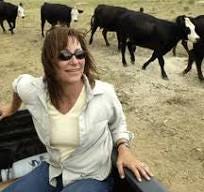Kathy Voth’s amazing website, On Pasture, is a national treasure for anyone who grazes animals, is thinking about grazing animals, or who works with people who graze animals. Now in her “retirement,” Kathy manages the site as a library or archive, curating the hundreds of articles that she and others have contributed over the years.
I put retirement in quotes, because she regularly publishes an email newsletter calling attention to one of the 2,500 plus articles in the On Pasture library and occasionally posts a bit of new content.
This week’s new content is some of the best analysis of a development in federal agricultural policy I’ve seen since the beginning of the second Trump administration.
Her most recent newsletter came out last week and it contains a view into the so-called One Big Beautiful Bill, (also known as the Big Budget Bomb). Based on the criticism of the bill that has come from many quarters — not just Democrats, but moderate Republicans and non-partisan economists — it shouldn’t be a surprise that ag policy appears to transfer borrowed money from the US Treasury to the wealthiest Americans and most profitable corporations.
While no one doubts this will increase payments to large farming operations and corporate landowners, none of the spending is paid for. Like so many other wealth-transfer mechanisms in the bill, it balloons the budget deficit and federal debt.
You can, and should, read her piece, titled Do the Changes to the Farm Safety Net Make you Safer? here. One of the reasons that Kathy is my hero is that she’s calm and matter-of-fact about what the bill, in its current form, would do if passed. Her piece is non-partisan and she discloses her biases. It’s extraordinarily well researched and written.
There are likely to be changes to the Big Budget Bomb before it’s passed and signed. The House and Senate have differences to iron out, and some elected officials are starting to actually read the bill and have qualms about passing it. It’s not out of the question that it could completely fall apart. But for a clear-eyed analysis of where we stand today, you can’t do better than Kathy’s piece.
To expand a little bit on some of the changes she points out. Under the current farm bill, there’s a limit of $900,000 of adjusted gross income. If you make more than that in a year, you’re not eligible for most USDA programs. Remember that your AGI is the number on your tax return after all your deductions but before any tax credits. So its much less than your overall income, and somewhat more than your taxable income for most people and businesses.
For most purposes, what the bill refers to as a “pass-through entity” is a shell company. If I’m a part owner of an ag corporation but would personally be ineligible for USDA payments*, sometimes my clever lawyers will set up an LLC or other form of company, to which I transfer my interest in the farm corporation. Often this shell company could be eligible even if I’m not personally.
Current law requires USDA to look at the beneficial owners of this kind of company and determine if they are eligible as individuals, rather than looking at the pass through company’s eligibility on its own. The Big Beautiful Bill would end this, allowing shell companies to collect USDA payments on behalf of their billionaire non-farming owners.
And lastly, the combined payment limit on farm bill payments would be stricken under this bill. Under current law, most farmers are limited to $450,000 in USDA payments in most programs.
I’m sure that within days of these provisions passing — if they do pass — the legal teams of all the big ag corporations will be busy setting up new structures to own land, own farming operations, and participate in USDA programs to maximize the payouts they can get. There will be theoretically no limit (other than the number of dollars appropriated for each program) to what they can extract from the Treasury.
*The most common reasons for being ineligible for USDA programs are adjusted gross income in excess of $900,000, having already obtained more than $450,000 in payments, or having violated agricultural wetlands and soil erosion regulations.




My hero, too. A voice of reason and truth.